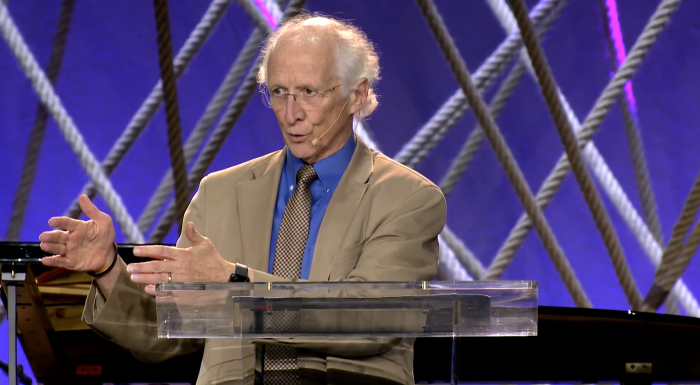John Piper lists 8 ways the Old Testament doesn't apply to Christians

Noted theologian and preacher John Piper recently listed eight ways he says the Old Testament doesn't apply to modern Christianity while also believing that the promises of the Hebrew Bible largely apply to the Church.
In an episode of the podcast “Ask Pastor John” posted last week, a listener named Maureen asked Piper, “Which Old Testament verses are for me, as a Christian, today.”
“Sometimes I select a verse that is meaningful to me from my Bible reading in the morning. But then later in the day, as I further reflect on it, it feels like I’ve lifted the verse out of context and misapplied it to myself. How, Pastor John, do I know which Old Testament promises are for me?” Maureen asked.
Piper responded that, while he believed “all of the Old Testament is for those who are in Christ Jesus,” there were still “differences between the people of God — the Church — today and the people of God — Israel — in the Old Testament, and how God relates differently to each.”
Piper listed eight specific differences, beginning with how Old Testament Israel was “an earthly, political nation-state,” while the modern Church “is a people whose citizenship is in Heaven and who are sojourners and exiles here, scattered among all the nation-states.”
The second difference Piper pointed to was that Israel was “a theocracy to carry out God’s punishments for those who broke His law, including capital punishment for idolatry and various other sins.”
“The Church is not a civil government and is not authorized as a church to carry out God’s punishments. Excommunication from the church through church discipline replaces execution through the judicial processes,” Piper said.
A third difference is that Israel was “basically one ethnicity” while “the Church is made up of all ethnicities.” Piper added that “practices that were designed to separate Israel from the surrounding peoples and ethnicities” are “done away with as requirements for God’s people.”
The fourth difference Piper laid out was that while Israel “had defined geographic borders and a geographic religious center,” the New Testament Church “has no geographic borders or religious center.”
A fifth point of difference, according to Piper, was that individuals were born into ancient Israel, while “people are born again into the Church.”
“The new covenant is entered by the miracle of God’s forgiving sins through faith and through God’s writing the law on our hearts,” he explained.
Difference number six was that Israel did not have a “great commission,” specifically a call on members to evangelize, whereas the New Testament believers are called to evangelize.
“The Old Testament religion was mainly a ‘come and see’ religion, while the New Testament religion is mainly a ‘go and tell’ religion,” Piper said.
A seventh difference, according to Piper, was that ancient Israel had a sacrificial system in place, “but that entire system was done away with when Jesus fulfilled it by becoming the final sacrifice and by acting as the final High Priest.”
As a final point of difference, Piper pointed to the Holy Spirit, with the theologian saying that “the people of God in the Old Testament did experience the working of the Spirit of God, but they did not experience or know the Spirit as the indwelling Spirit of the risen Christ.”
“Today, we know the Holy Spirit as the Spirit of Christ. He works in His Church, therefore, in a way that he did not work in the Old Testament, because the Church is His body, the body of the risen Christ,” he added.
Despite the key differences, Piper added: “We can take any text in the Old Testament and make it our own by treating it as fulfilled in Christ, with the necessary changes implied in those points.”

In May 2018, megachurch Pastor Andy Stanley garnered controversy when said in a sermon that Christians needed to "unhitch" the Old Testament from their faith.
Stanley referenced Acts 15, in which the leaders of the early Church decided that Gentile converts did not need to strictly observe Jewish law to become Christians.
"[First century] Church leaders unhitched the Church from the worldview, value system and regulations of the Jewish Scriptures," said Stanley. "Peter, James, Paul elected to unhitch the Christian faith from their Jewish Scriptures, and my friends, we must as well."
Critics, among them Messianic Jewish author and radio host Michael Brown, argued that “throughout the New Testament,” Gentile believers “were called to live holy lives, based on Old Testament teaching.”
“Pastor Stanley forgets that the Old Testament also tells us the story of Israel, including Israel’s blessed future,” wrote Brown at the time.
“Cut out the Old Testament, and you cut out much of Israel’s destiny, which all believers should understand. Cut out the Old Testament, and you also cut out the destiny of the nations.”
For his part, Stanley told Brown in an interview in July 2018 that he still considered the Old Testament inerrant, and that his comments were centered more toward an audience that does not trust the Bible.
“I told my kids growing up, if anyone ever asks you, 'Do you believe Adam and Eve are real people?' here is how you are to answer: do not say 'yes' because the Bible says Adam and Eve were real people,” Stanley said.
"You say this: 'I believe Adam and Eve were historical characters because Jesus did. And when somebody predicts their own death and resurrection and pulls it off, I go with whatever they say.'"



























